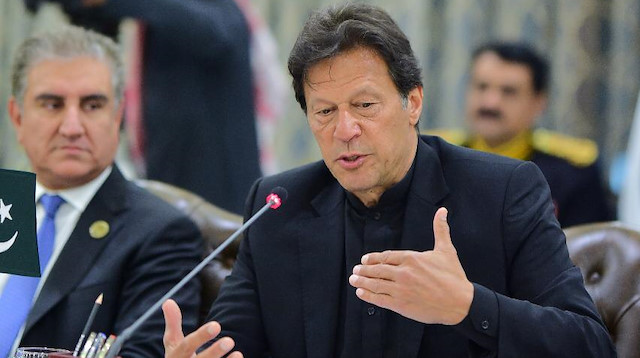
Presiding over a meeting in Islamabad, Khan approved in principle the draft for the Pak-Turkey Strategic Economic Framework, according to reports
Pakistani Prime Minister Imran Khan has issued directives calling for an early finalization of the Strategic Economic Framework that aims to transform bilateral ties between Turkey and Pakistan into a “broader strategic economic relationship.”
Presiding over a meeting in Islamabad, Khan approved in principle the draft for the Pak-Turkey Strategic Economic Framework, according to reports.
Khan also directed concerned ministries to “vigorously pursue this framework and put in place strong institutional arrangements for its implementation, once finalized.”
Diplomatic relations between Turkey and Pakistan were established in 1947, soon after Pakistan came into being as the then largest Muslim country on world map.
Turkey was among a few countries that quickly recognized Pakistan after its creation and supported its successful bid to become a member of the United Nations.
Pakistan and Turkey have been part of several economic and defense treaties in last 72 years. Baghdad Pact was the first forum the two countries shared in 1950s. The pact was initially signed by Turkey and Iraq in 1954 and was later converted into Central Treaty Organization or CENTO in 1958 after Baghdad ceased to be a member.
In July 1964, Turkey, Pakistan and Iran formed the Regional Cooperation for Development (RCD) to strengthen the socio-economic cooperation between the three countries. The RCD was later converted into Economic Cooperation Organization (ECO) in January 1985 by the same three members.
In 1992, the ECO was expanded, and seven new members -- Afghanistan, Azerbaijan, Kazakhstan, Kyrgyzstan, Tajikistan, Turkmenistan and Uzbekistan -- were included.
Ankara and Islamabad are also the members of the Organization of Islamic Countries (OIC) as well as the D-8 Organization for Economic Cooperation, and often support each other’s stand on different regional and international issues -- including Kashmir, and Palestine.
Pakistan has always supported Turkey’s stand on Cyprus, while Ankara supports Islamabad’s stance on Jammu and Kashmir.
Hello, the comments you share on our site are a valuable resource for other users. Please respect other users and different opinions. Do not use rude, offensive, derogatory, or discriminatory language.
The floor is all yours.








